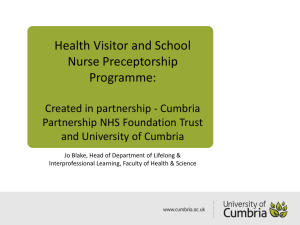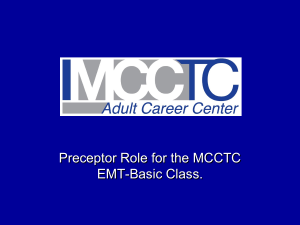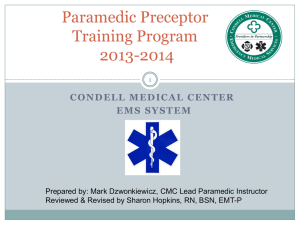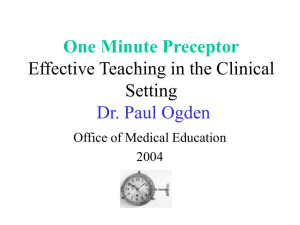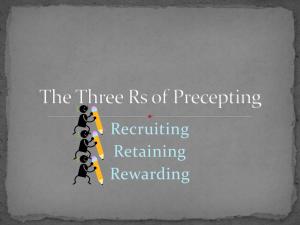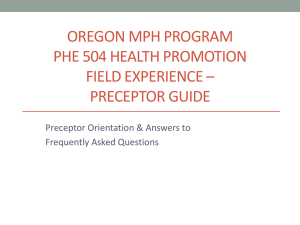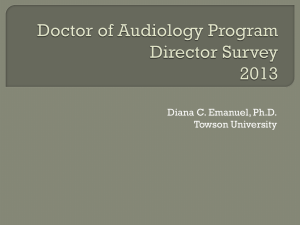The Methodology and Structure of the ABA Practice
advertisement
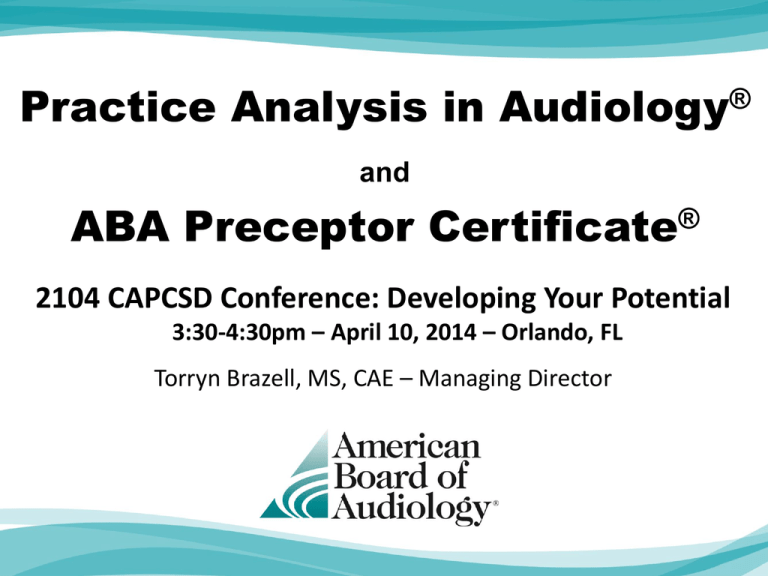
Practice Analysis in Audiology® and ABA Preceptor Certificate® 2104 CAPCSD Conference: Developing Your Potential 3:30-4:30pm – April 10, 2014 – Orlando, FL Torryn Brazell, MS, CAE – Managing Director ABA Credentials and ABA Assessment Based Certificates Board Certified in Audiology Established 1999 Cochlear Implant Specialty Certification (CISC) Established 2004 Next Exam: CHOP October 5, 2014 – Philadelphia, PA Pediatric Audiology Specialty Certification (PASC) Established 2011 Next Exam: CHOP October 5, 2014 – Philadelphia, PA ABA Preceptor Training Certificate Program Pilot Tested March 2015 at AudiologyNOW! 2015 Conference in San Antonio, TX Highlights of the ABA Practice Analysis in Audiology WHAT IS A PRACTICE ANALYSIS? • Structured process to describe a profession • Mixed-methods design • Education & training - Job Descriptions & Career Ladders Continuing Competencies Certification Examinations Scope of Work Standards of Practice Curriculum Development & Standards Preliminary Data Collection Academic Program Review Employer Interviews Thought Leader Interviews December 2011 – February 2012 Synthesis for Review by Project Task Force of Subject Matter Experts Delineating Audiology Practice • Task force meets to delineate audiology practice March 2012 – November 2012 • Delineation evaluated by external reviewers December 2012 – March 2013 • Delineation revised by task force April – July 2013 • Final approval by Steering Committee August – November 2013 • Demographic Survey and Practice Analysis Survey Developed December 2013-February 2014 • Beta Survey April-May 2014 What’s Next? • Beta Survey of Practice Analysis in Audiology April-May 2014 • Final Survey in June-July 2014 to 2,500 audiologists • Analysis and synthesis August-September 2014 • Fall 2014 “State of the State of the Profession of Audiology Report” DOMAINS OF AUDIOLOGY PRACTICE NEW Practice Analysis in Audiology D1: Assessment and Diagnosis of Patients with Auditory and Vestibular Disorders D2: Treatment and Management of Patients with Auditory and Vestibular Disorders D3: Professional Practice D4: Public Education, Service, and Prevention KNOWLEDGE DOMAINS Practice Analysis in Pediatric Audiology (PASC) D1: Laws and Regulations D2: General Knowledge about Hearing and Hearing Loss D3: Child Development D4: Screening and Assessment Procedures D5: Counseling D6: Communication Enhancement Technology D7: Habilitation/Rehabilitation Strategies, Educational Supports KNOWLEDGE DOMAINS Cochlear Implants Specialty Certification (CISC) D1: Candidacy Considerations D2: Counseling/Expectations D3: Surgical Considerations D4: Programming Principles/Speech Coding D5: Device Operation D6: Trouble Shooting D7: Rehabilitation D8: Outcomes ABA Preceptor Training Certificate Program FAQ’s The American Board of Audiology® (the ABA), has launched work on the development of a Preceptor Certificate program, designed for audiologists who provide clinical instruction to audiology students. The following list of FAQs provides more information on this important initiative. ABA Preceptor Training Certificate Program FAQ’s The American Board of Audiology® (the ABA), has launched work on the development of a Preceptor Certificate program, designed for audiologists who provide clinical instruction to audiology students. The following list of FAQs provides more information on this important initiative. What is the purpose of the ABA Preceptor Certificate Program? To give audiological Preceptors structured, standards-driven, assessment-based professional training that supports and validates their competency to serve as clinical educators. For whom is the Preceptor Certificate Program being developed? All audiologists who are or plan to serve as preceptors. Is the Preceptor Certificate designed to be a professional certification? No. It is a training program. The Preceptor Certificate is a voluntary training program designed to support and enhance the skills of clinical educators. What is the Certificate Program format? • training modules • modules are assessment-based – assessment upon completion of each module • Certificate of Completion awarded Will you be required to first hold an ABA credential to participate in the Preceptor Certificate Program? No. The Preceptor Certificate Program is voluntary and independent of a certification or membership in any organization. Is the Preceptor Certificate just for Preceptors of 4th year externships? No. The training will be relevant to preceptors working with students in any clinical placement during any year of a doctoral program. How long has the ABA Preceptor Certificate been considered? A preceptor training program has been needed, and discussed by myriad audiologists, for years. Serious ABA development discussions began in March 2011 during the AudiologyNOW! conference in Chicago. Primary focus was 1st the development of the ABA Practice Analysis in Audiology, to be utilized in the development of Preceptor training. What topics will the Preceptor Certificate training curriculum cover? 1) Adult Learning Principals and Styles * teaching and evaluating clinical skills in a clinical setting * the role of motivation in learning and its impact on clinical teaching 2) Mentorship and Coaching * managing vs. mentoring * self-reflection role modeling What topics will the Preceptor Certificate training curriculum cover (cont.)? 3) Professional Role of an Audiologist 4) How to Teach: Supervising vs. Precepting * structuring authentic clinical situations * guiding clinical learning and providing appropriate line-of-site supervision when needed * case studies * role-playing techniques 5) Legal and Ethical Situations Don’t most Preceptors receive special training to be clinical educators? Our interviews with clinical training program placement coordinators/directors indicate that some preceptors receive special training while others do not. To what standards is the ABA Preceptor Certificate being aligned? 1) The ABA Practice Analysis in Audiology, “The State of the Audiology Profession in 2014” 2) The Clinical Education Guidelines for Audiology Externships, issued by the American Academy of Audiology 3) ASTM E2659-09E1, American National Standards Institute, Standard Practice for Assessment-Based Certificate Programs Are audiologists being consulted on the curriculum’s content? Yes. A comprehensive stakeholder analysis and gap analysis are underway to ensure that the needs of current preceptors as well as practitioners considering the role are addressed. IN-PROCESS NOW GAP ANALYSIS: January-April 2014 Interviewing five (5) SME groups: 1. recent AuD graduates 2. current preceptors 3. clinical placement coordinators 4. non-preceptor audiologists 5. audiologist employers What type of questions are being asked? Recent Graduate Background 1. At what post-secondary institution did you complete your AuD studies? 2. What year did you graduate? Preceptor Selection / Student Matching Experiences 1. How did you connect with a preceptor to complete your externship? 2. If you were connected with a preceptor through a placement coordinator or faculty of your audiology program, did they provide you with any specific guidance in selecting your preceptor? 3. What was/were the deciding factor(s) for you in selecting an externship site? 4. Were you satisfied with the alignment of your externship placement with your clinical interests? 5. What preparation for the externship experience was provided to you by your doctoral program? What type of questions are being asked? The Externship Experience 1. How would you describe the working style of your preceptor (mentor/manager/etc.) 2. Did you have a clear understanding of the performance expectations and learning goals to be met during your externship placement? 3. What was a typical day like for you as an externship student? 4. What went well? 5. What needs improvement? 6. What do you think was critical for you to learn during the externship? 7. Did your externship provide you with adequate clinical experience to prepare you for independent practice? If not, where were the gaps? 8. Did your externship provide you with opportunities to build professional competencies, such as time management, client communications, administrative operations, etc., to prepare you for independent practice? If not, where were the gaps? What type of questions are being asked? Preceptor Background Gap Analysis Questions 1. What is the clinical setting of your practice? 2. How long have you served as a preceptor? 3. How many students have you supervised? 4. What types of student field placements have you supported as a preceptor? (e.g. shorter-term practicums with undergraduates? 4th year externships with doctoral students? other?) 5. What audiology programs have you worked with? 6. Have you served as a preceptor for students from more than one audiology program? If yes, how did your experiences as a preceptor for students from different schools compare? Preceptor Selection 1. What (if any) criteria or standards were you required to meet to qualify as a preceptor? 2. Have you ever received any specialized training to prepare you for the preceptor role? Student Matching Experiences 1. To what extent do administrators from the audiology programs with which you have worked facilitate the match between you and students? To what extent are these relationships established on an ad hoc basis? (initiated directly by students) 2. Have you had any negative experiences with poor student matches? What happened? 3. What criteria would you suggest be built into a preceptor/student matching process to ensure the most productive learning experience for the student and the most positive preceptor experience for you? What type of questions are being asked? Exploring Training Needs 1. What do you believe are the most important areas students should focus on during their field placements? 2. What teaching strategies do you use? 3. What is a typical day like for an externship student working in your practice? 4. To what extent are you able to organize and coordinate the student’s work assignments with your own so that they remain in your line of sight for clinical care delivery? What difficulties have you encountered in maintaining line-of-sight supervision? 5. Do you give externship students assignments for which you do not keep them in your line of sight? 6. Looking back to your first experience serving as a preceptor, what knowledge/skills/resources do you WISH you’d had then? 7. As an experienced Preceptor, what information, tools, and resources would add value to the training for a Preceptor Certificate program? 8. What is your preferred format for continuing education experiences? (independent study, asynchronous web-based coursework, real-time webinars, blended course design, face-to-face workshops, etc.) Who is overseeing the development of ABA’s Preceptor Certificate? The American Board of Audiology, an independent credentialing organization established in 1998, that promotes the highest level of professional development and ethical practice in the field of audiology. Steering Committee made up of stakeholders and leads LiLi Taylor, MA, Instructional System Designer and Torryn Brazell, MS, CAE, Managing Director for the American Board of Audiology WHAT’S NEXT? May/June/July 2014 Subject Matter Expert Focus Groups & Face-to-Face Meetings August/September 2014 Curriculum Goals & Objectives Finalized October/November/December 2014 Training Module Story Boards, Assessments, and Delivery Methods Finalized January/February 2015 Train the Trainers / Mock Training / Calibration March 2015 Pilot Testing in San Antonio – AudiologyNOW! When will the ABA Preceptor Certificate launch? The certificate is scheduled to be pilot tested during the AudiologyNOW!15 Conference in San Antonio, TX, March 25, 2015, as a Learning Lab. How will the Preceptor Certificate benefit current Preceptors? The training will provide ideas, tools and resources to effectively manage students in clinical placements; it will reference the 2014 ABA Practice Analysis in Audiology, which validates the current state of the audiology profession through the most current skills, tasks and abilities. How will the Preceptor Certificate benefit students? Training will introduce a new level of consistency in the quality and constructiveness of clinical experiences. Students may choose to be mentored, or select clinical experiences within their training, at sites where the Preceptor has elected to identify themself as having acquired the distinction of the Preceptor Certificate of Completion. The ABA encourages AuD students to advocate individually, selecting an externship that best fits their career goals. Q&A For more information: Torryn Brazell, MS, CAE – ABA Managing Director tbrazell@audiology.org
